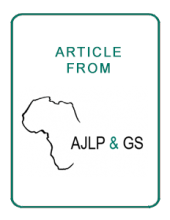/ library resources
Showing items 1 through 9 of 53.Most of the land in sub-Saharan Africa is governed under various forms of customary tenure. Over the past three decades a quiet paradigm shift has been taking place transforming the way such landl is governed.
Scaling up promotion of land rights and improved access to land for the poor, women and other vulnerable groups has been at the core of the global land community’s agenda.
Land is a key economic resource inextricably linked to access to, use of and control over other economic and productive resources.
According to the U.N. and World Bank, 40 percent of the global population is affected by water scarcity, and by 2030, up to 700 million people could be displaced as a result.
Between 1981 and 2003, nearly a quarter of global land got degraded, says UNCCD Executive Secretary Ibrahim Thiaw.
The use of land consolidation on customary lands has been limited, though land fragmentation persists. Land fragmentation on customary lands has two main causes—the nature of the customary land tenure system, and the somewhat linked agricultural system.
We examine collaborations between the state and civil society in the context of land grabbing in Argentina. Land grabbing provokes many governance challenges, which generate new social arrangements.
This paper examines the intersections between youth access to land, migration decisions and employment opportunities using nationally representative and multi-year data from multiple African countries.
A narrative on rural youth in Africa has continued to evolve in policy circles around the world. Much of it is driven by population statistics that point to an imminent youth bulge in Africa and concerns about a poor economic outlook (stagnation) for African productivity and growth.
Pagination
Land Library Search
Through our robust search engine, you can search for any item of the over 73,000 highly curated resources in the Land Library.
If you would like to find an overview of what is possible, feel free to peruse the Search Guide.


